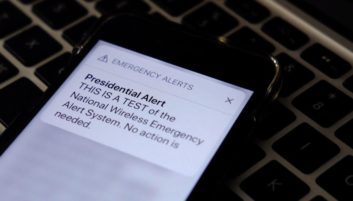
Groups representing Deaf and hard-of-hearing people told the FCC it needs to mandate that emergency alerts appear on wireless devices, and recommends that streaming services like Netflix and Hulu carry them as well.
That came in comments on the FCC’s inquiry into how to improve its EAS emergency alert system.
The FCC is under orders from Congress to report back on the feasibility of extending the EAS mandate to over-the-top video given the rise in popularity of video streaming services.
The groups focused mainly on wireless and the need for those who have cut the TV cord to be able to get alerts via their smartphones, but in a footnote, they also said: “It is also recommended that messages be sent through streaming services so as to be accessible even for consumers who have cut the cord.”
[Previously: FCC Asks: Should Legacy EAS Be Redesigned Altogether?]
They also put in a pitch for government grants to nonprofits (like themselves) “that have direct engagement with the disability community,” so that they can “encourage further training and awareness on how to enhance emergency communications, awareness, preparation, and responses.”
Among the 20 groups joining in the comments were Telecommunications for the Deaf and Hard of Hearing, AccesSOS, American Deafness and Rehabilitation Association, and the Clear2Connect Coalition.
Streamers have argued their OTT services should not be required to participate in that system, saying it would not appreciably increase the number of people who get such alerts, but would appreciably increase the burden on streamers if they were required to deliver them. And the obligation would not just be on the major streaming video services, they said, but Peleton, and even online instructional yoga videos.
Broadcasters and cable operators agree that streaming companies should not be required to carry the alerts.
Cable broadband operators have told the FCC that the combination of already-required broadcast, cable and wireless alerts “are more than sufficient to convey timely and relevant emergency and public safety information to the public.”
Comment on this or any article. Email [email protected].






